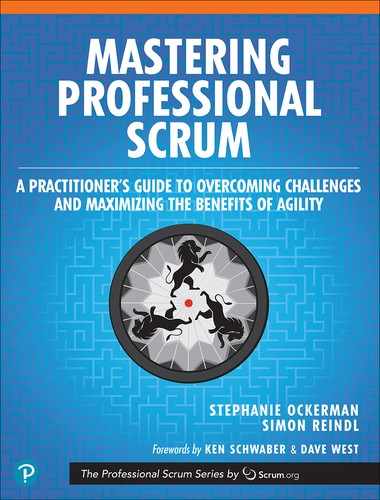Foreword by Dave West
What is Professional Scrum?
There is no question that the world of work is becoming more complex. It’s not that simple work is going away, but rather that much of this work will be replaced by automation, algorithms, and robotics. Complex work is best defined as work that is unknown—not just in terms of how we do it, but also in regard to the outcomes and impacts of that work. Even when we have a clear outcome in mind, it is only after we have delivered something that we appreciate that the impact of the change may be different from the one we intended.
Scrum was developed to help us chart our way through a complex world. The framework is simple yet powerful, providing a way to bring order and structure to complexity through discovery and learning. But to be effective with Scrum requires something more than just following the mechanics of the framework: It requires a professional attitude.
Ken Schwaber, the co-creator of Scrum, describes a professional as someone who works for money and follows established rules for the profession. He also adds that to be a professional means embracing a set of ethical standards. These standards both unify members of a profession and define that profession to the outside world, as does the Hippocratic Oath for the medical profession.
Building upon that model of professionalism, four additional elements are key to achieving professionalism using the Scrum Framework:
Discipline. To be effective with Scrum requires discipline. You have to deliver to gain learning; you have to do the mechanics of Scrum; you have to challenge your preconceived ideas about your skills, role, and understanding of the problem; and you have to work in a transparent and structured way. Discipline is hard and may at times seem unfair as your work exposes problem after problem and your efforts seem in vain.
Behaviors. The Scrum Values were introduced in the Scrum Guide in 2016 in response to the need for a supporting culture that would enable Scrum to be successful. The Scrum Values describe five simple ideas that when practiced encourage an agile culture: Courage, Focus, Commitment, Respect, and Openness describe behaviors that both Scrum Teams and the organizations they work within should exhibit.
Value. Scrum Teams work on problems that, when solved, deliver value to customers and stakeholders. Teams work for a customer who rewards them for that work. But the relationship is complex, because the problems are complex: Customers might not know what they want, or the economics of the solution might be unclear, or the quality and safety of the solution may be unknown. The job of a Professional Scrum Team is, to the best of their ability, to do the right thing for all these parties by delivering a solution that best meets their customers’ needs within the constraints that have been placed on them. That requires transparency, respect for each other and for customers, and a healthy dose of curiosity to uncover the truth.
Helping others. Scrum is a team sport, but one where each team is small. In consequence, the team is often the underdog trying to solve problems that it barely has the skills and experience to solve. To be effective, Professional Scrum Teams must work with other members of their community to learn new skills and share experiences. Helping to scale the agility of the community is not completely altruistic, because the helpers often learn valuable things that they can bring back to help their own teams. Professional Scrum encourages people to form professional networks in which ideas and experiences that help teams can be exchanged.
Merely describing Professional Scrum does very little to help you realize those ideas in your organization or on your product. That is where Stephanie and Simon’s book comes in: It is a support book for Professional Scrum. It takes the Core Scrum Framework and puts it in the context of professionalism, describing why many of these ideas make sense and how they have evolved from different disciplines and concepts. Whether you read it from cover to cover or dip into a particular section for specific guidance, it provides practical advice for how you can master Scrum and become more professional. And that journey is long and never ends.
Good luck, and enjoy the ride.
—Dave West, CEO and Product Owner Scrum.org
